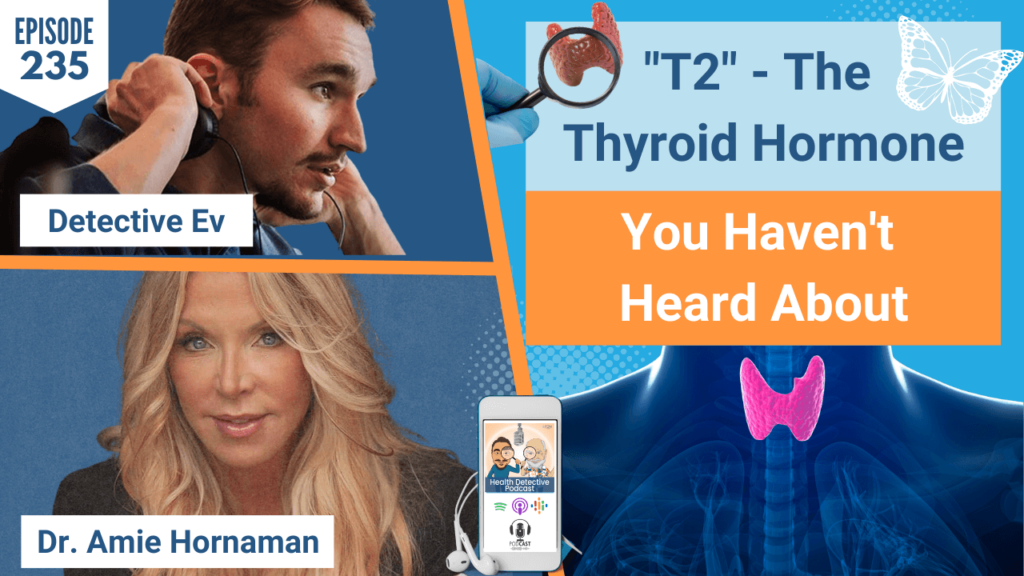Introduction
[00:00:00] Detective Ev: What is going on, my friends. Welcome back to another episode of the Health Detective Podcast by Functional Diagnostic Nutrition. My name is Evan Transue, aka Detective Ev. I will be your host for today’s show about T2 and other thyroid hormones.

We’re talking to a woman who probably needs no introduction. You guys have maybe heard of her before. Her name is Dr. Amie Hornaman, also known as the Thyroid Fixer. She’s got a lot going on, a lot of cool stuff. But I was pretty humbled in this conversation just in the sense that she brought up stuff that I hadn’t even really heard of before, and that’s pretty rare.
Normally, I’ll get a few things where I might have heard of it at a surface level, but never dove in information wise. I got plenty to learn, but this was cool. I like having stuff like this where someone just expands my horizons completely and really knows what they’re talking about on a specific set of topics.
If you somehow don’t know who she is, I’m going to give a quick background and then you’ll get to the podcast right away today. We actually interviewed her live right at KetoCon 2023, so that was amazing.
FDN’s Health Space Unmasked – Dr. Terry Wahls
Also, if you guys are listening to this, you still have some time to register, like basically a couple days to register, for our Health Space Unmasked event. That is fdntraining.com/unmasked. That will be in the link below.
Health Space Unmasked is our free event every single month. It’s only done on the first Saturday of every month and we have an awesome topic, awesome guest. This is where you guys heard Dr. Ruth Roberts when she was talking about pets. This month we will be talking to none other than the great Dr. Terry Wahls. That is absolutely a name that you heard of.
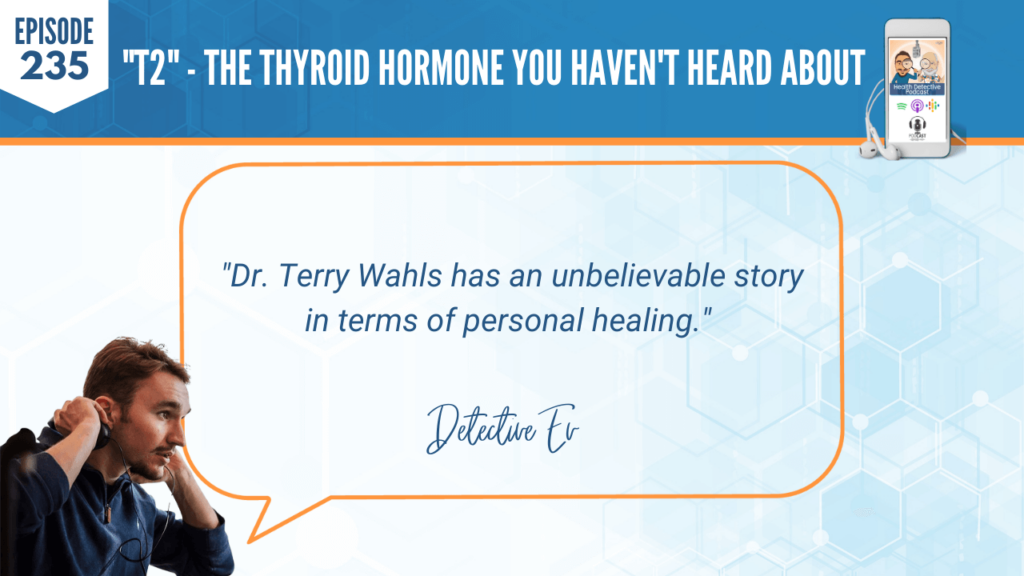
I feel like this is one of the first things people end up reading or studying when you get into this space. Dr. Terry Wahls has an unbelievable story in terms of personal healing. If you somehow don’t know that you definitely gotta hop on.
Again, click the link in the show notes and we’ll get you guys registered. It’s a completely free event. Those are some of our most value driven events that we host for free. So, check this out and I’ll see you guys there. Hopefully I’m going to be on myself.
About Dr. Amie Hornaman
A quick background on our friend Dr. Amie Hornaman. She is known as the thyroid fixer and is host of the top-rated podcast in medicine and alternative health, The Thyroid Fixer, with listeners around the globe. She is the founder of the Institute for Thyroid and Hormone Optimization, an organization with transformational proven approaches to address thyroid dysfunction and support people in returning to full health.

Dr. Amie is also the creator of The Fixxr™ Supplement line with revolutionary proprietary supplements that are changing the lives of many people. Ultimately, she is a woman on a mission to optimize thyroid patients around the world and give them their lives back. Her bio is of course, more extensive than this, but if you guys want to read that, I will have that in the notes for you.
Without further ado, let us get to our Live interview with Dr. Amie Hornaman. All right, Dr. Amie, welcome to the Health Detective Podcast. How are you?
[00:02:47] Dr. Amie Hornaman: Thank you so much. I love being here.
[00:02:48] Detective Ev: Yeah. This is fun. We are at KetoCon 2023 Live in person.
It’s actually really weird to get to do podcasts like this. We were supposed to do one yesterday, not you and me, but someone else didn’t work out. And I like this. I can get used to this for podcasts.
[00:03:01] Dr. Amie Hornaman: I know. You get to smell bacon, watch people walk around.
[00:03:04] Detective Ev: Yeah. You guys have no idea what we’re dealing with. We got people cooking bacon literally right next to us while we’re doing this. So, I’m sure we both have the same plan afterwards finishing this podcast.
Dr. Amie Hornaman: Absolutely.
T2: Gaining Weight
I always like to start the show off pretty much in an identical way. No one gets into this space by accident as a client or as a practitioner. There is typically something that leads to this. Very few five-year-olds right now are telling their parents, mom and dad, I can’t wait to go to KetoCon when I’m older. You know, it’s intentional. So, I have to ask, how did you kind of end up in this space? What was your original background? And then we’ll talk about more technical stuff after that.
[00:03:38] Dr. Amie Hornaman: Yeah, absolutely. So, I started 20 some years ago. I was competing in NPC Fitness and figure competitions. I was doing fitness modeling at the time, too. You know, that’s really rigorous. You have to diet down your eating. You’re eating keto, basically. You’re eating the meat and the fish and the broccoli and the asparagus. You’re hitting the gym a couple times a day. I had done it many times before, so I knew how to prepare and how to get my body into that kind of shape.
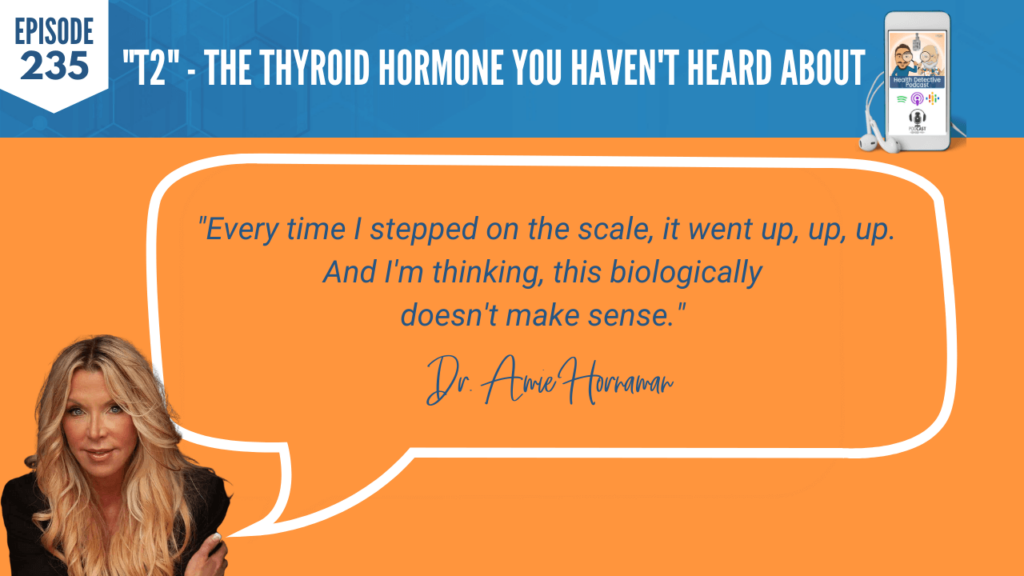
This one particular show I was getting ready for, the NBC Pittsburgh, was a huge show, the scale was going up and not down. Every time I stepped on the scale, it went up, up, up. And I’m thinking, this biologically doesn’t make sense. I mean, even your listeners know like, wait a minute, if she’s doing this and this, she shouldn’t be gaining weight.
So, I did what we all do. I go to the doctor.
T2: A Diagnosis
I went to my doctor, and I said, this is what’s going on, doc. This is what I’m eating. Look at this, what’s happening in my body. Because I really felt my body was rebelling against me. And I got told, you’re normal; everything’s fine. It’s all in your head. Just not a big deal.
Now I was 25 pounds heavier. On a little 5’2″ frame that is a lot of extra weight to carry. And I wanted an answer. At that point, I didn’t even care if they told me it was something serious. I just wanted an answer. I went to six different doctors, all of them misdiagnosed me.

The seventh one finally gave me the diagnosis of hypothyroidism. You have hypothyroidism, Hashimoto’s, and here’s a pill. I left the office all pumped up. I’m like, sweet, there’s a pill. I’m going to lose weight. I have a name for this. I have a name for it. I left and I started on it.
Five months later, nothing happened. Not one pound lost. I didn’t feel better. Nothing. I got frustrated. I was really low; I was really depressed. Really low because I thought, well, maybe there isn’t an answer. Maybe it is just me. Maybe I need to do more. Maybe I need to eat less and exercise more.
Then I found functional medicine. I kept hearing the name of this practitioner. You know, you hear something a couple times, you’re like, all right, that’s the universe telling me I gotta go. Right? So, I went to see him, and he completely changed my life. He did all of the testing that should be done.
T2: Getting Better and Wanting to Help Others Get Better
We looked at the entire profile, my supplements, my food, my labs, my medication. He put together what I now do for my patients, a total plan, the right thyroid hormone replacement, the right supplements, the right way to eat. When all that came together, my body responded and that was it. That was it for me.
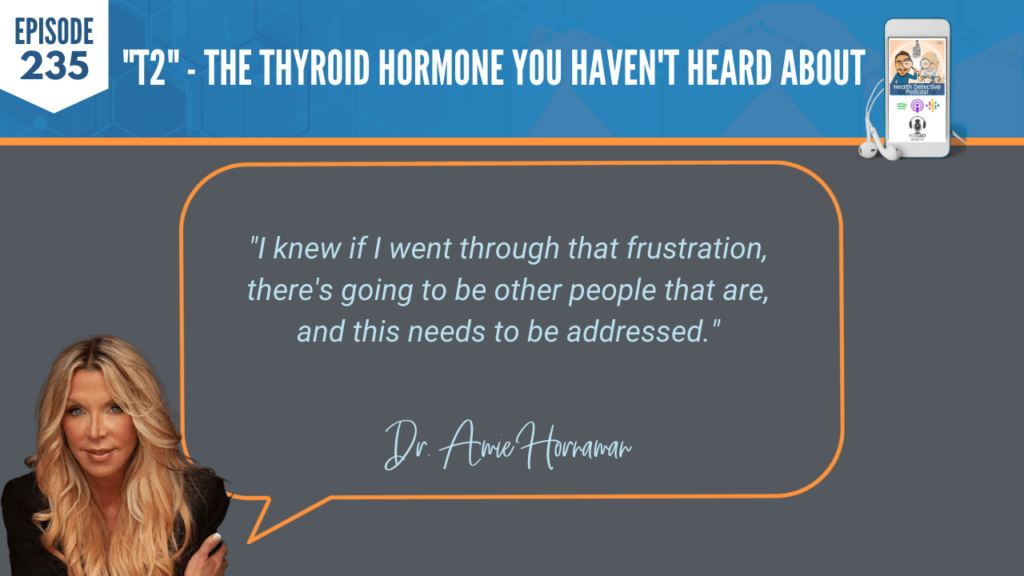
I knew if I went through that frustration, there’s going to be other people that are, and this needs to be addressed. I need to go out in the world and help people. So that’s what totally changed my career.
[00:06:20] Detective Ev: That’s an awesome story. I was going to say, it’s awesome, obviously not overall, but what it led to is kind of beautiful. You know, it created this passion and stuff.
And what’s fascinating is when FDN first started as a course, like 14, 15 years ago, it was mainly attracting people who had been through exactly what you’re talking about. There was a lot of personal trainers, there was a lot of fitness competitors, and they were kind of getting screwed.
I feel so bad, especially for the women in this space. I know it’s not the main topic of today, but it’s something I have to recognize. For those listening that don’t know, there are studies showing now that women are more likely to get told it’s in your head or, oh, you’re fine. You need to be a little less stressed. You know what I mean? Clearly something was wrong here.
T2: The “Sounds Like” Method
I also think too, I have such a respect for the people in the fitness competition space, cause it’s hard as crap. Let’s be honest. That is not an easy thing to do. I think it’s even harder on women’s bodies because there’s still this expectation to be incredibly low body fat percentage. But again, the studies show that a male can maintain a lower body fat percentage, slightly easier than a female can. So, you guys are exceptionally beating up your body in these cases.
And just to be clear for the audience, what were you doing professionally at the time while you were competing?
[00:07:23] Dr. Amie Hornaman: I was still in the health space. I was doing basic nutrition. I was basically helping other people with show prep. You know, doing diet plans and doing workout plans and helping people in the gym. But it wasn’t this deep into the medical side. That’s my passion now.
I love it. Gimme a set of labs and I geek out. Which I’m sure a lot of your listeners are like, yeah, gimme those labs.
[00:07:46] Detective Ev: Yeah. And that’s why I’m excited to talk about that today. Because the other lesson here is too, Reed Davis, the founder of FDN, constantly says this, and I think having a real-life example helps connect this with people.
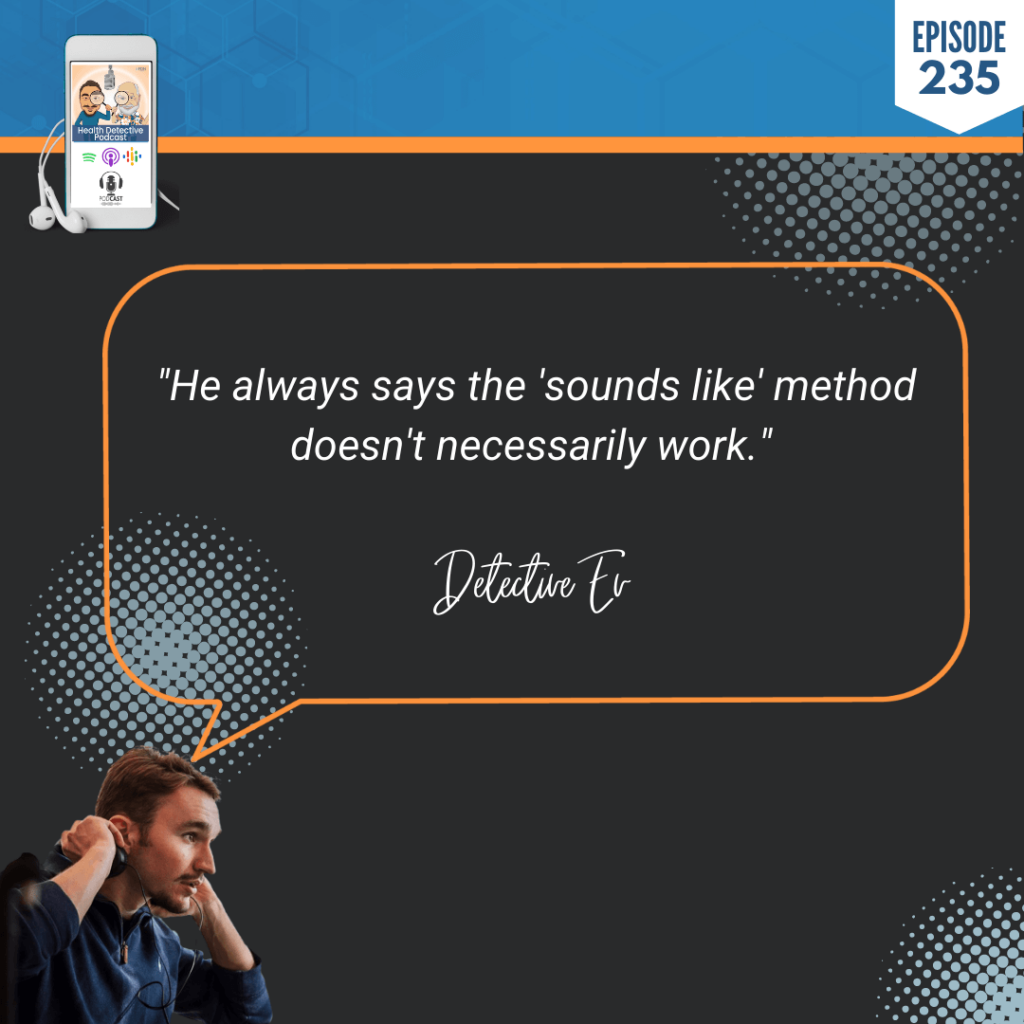
He always says the “sounds like” method doesn’t necessarily work. This is kind of why. Because once you even got someone to recognize the thyroid thing, you did get the treatment, which is partially correct. You should have been treated for thyroid, but you’re months in and nothing’s really working, right?
T2: The Thyroid Hormone Change That Worked
When you only do something on the “sounds like” method, it says, oh yeah, sounds like thyroid. You run a lab to validate it. Ah, pat yourself on the back. Yeah, we were right. Sounds like thyroid, except it didn’t work and you needed more stuff.
I’m curious too, before you transitioned, can you list off, do you know the most profound thing for you? Was it a dietary change? Was it a mental change? Like what led to actually getting you better? Or was it the whole set and it’s kind of hard to pinpoint.
[00:08:36] Dr. Amie Hornaman: It was the thyroid hormone change. Cause they had put me, just like you said, what Reed says all the time, love Reed. You can’t take a one size fits all approach.
And one of the issues that we’re seeing really in conventional medicine today, but in all forms of treatment, is you do this and then you do this. So, a person has a thyroid problem, give them T4. That’s it. And that is the standard of care in today’s world. That’s why so many women are still suffering.
I say women, because women get hit with hypothyroidism much more than men. I mean, there is a subset of men that still get hit with it, but women get hit more than men do. It’s just a shame that we just slap these protocols on people without really looking at who they are and what they really need without testing thoroughly.
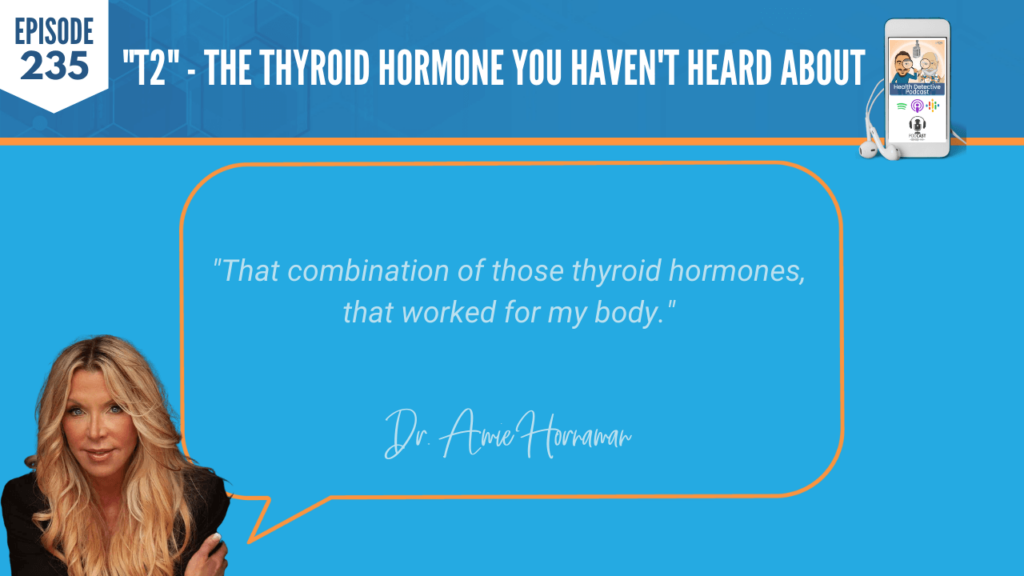
I would say it was that change of, you go off of T4 and you add in T3. That combination of those thyroid hormones, that worked for my body.
T2: Addressing the Real Problem
Again, it’s not a one size fits all. It might not work for your body, but that’s what worked for mine. Then everything else fell into place.

What I see in my practice is women will come to me and they’ll say, I’m doing all the things. I’m taking the supplements, I saw a nutritionist, I’m addressing my stress, I’m sleeping, I’m doing all the things, but nothing is working. Well, yeah, because your thyroid is completely waxed. Nothing is going to work unless we address this.
But then once we address it, then you get the reward for your effort. Then you get the bang for your buck for getting to bed and getting eight hours of sleep and hitting the gym and eating clean. It all starts to work together so beautifully.
[00:10:12] Detective Ev: Awesome. So, okay. You have this experience; it creates this passion; it ends up being a beautiful thing. What training did you do afterwards? Or was it a lot of self-study? Like how did you get to the point where you felt, okay, wait, I can apply this to other people in practice.
[00:10:26] Dr. Amie Hornaman: Well, yes, a lot of experience. But then I got my master’s in clinical nutrition, my doctorate in clinical nutrition, and then I became a functional medicine practitioner, all of that.
[00:10:35] Detective Ev: So, a lot of experience here. And listen, our audience is very open. I mean, we go through an eight-month certification and unfortunately, I say unfortunately, tongue in cheek, but we can help people better than a lot of Western medicine.
Dr. Amie Hornaman: Oh, FDNs are awesome.
T2: Dr. Amie’s Stereotypical Patient
Detective Ev: It’s just kinda funny though. You go through eight months and as a young man, I can do this a lot better in terms of getting people well than sometimes people who went to school for 12 years.
Dr. Amie Hornaman: Ah, yeah. That’s an understatement.
Detective Ev: Yeah. It’s the wrong system. It’s not a knock at the intelligence or knowledge even of Western medicine, but clearly, they’re learning the wrong thing, if I can go figure this out in eight months and they’re having trouble in 12 years.
So, you, kind of, again, reinvented yourself and now you’re helping people with this. Who is the stereotypical person that comes in? Is it exclusively thyroid sufferers? Are there other people that will work with you as clients or patients, whatever you refer to them as?
[00:11:19] Dr. Amie Hornaman: No, we do hormones too because it’s all tied together. I mean, you know, whenever the thyroid’s off, we’ll normally see insulin resistance. We’ll see dysregulated hormones.
So, we might have a woman that has PCOS and really high androgens, high testosterone. We might have a perimenopausal, menopausal woman that has all of her hormones in the tank, you know, estrogen, progesterone, testosterone are all low and her thyroid is off.
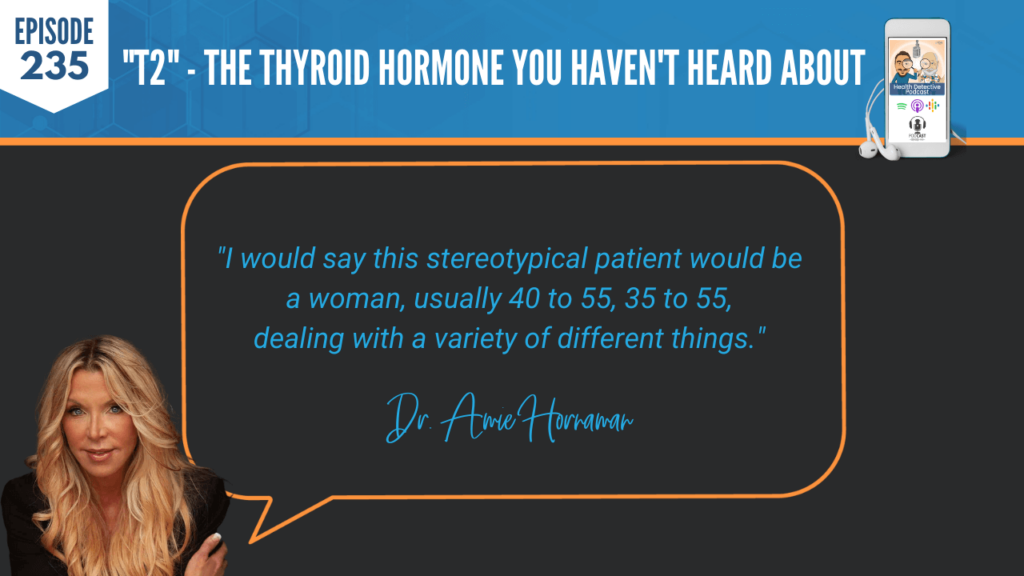
I would say this stereotypical patient would be a woman, usually 40 to 55, 35 to 55, dealing with a variety of different things. It could be weight gain, it could be infertility, it could be just extreme fatigue, loss of libido, hair loss. I mean the symptoms go on and on. But they all kind of tie together to paint that picture of, okay, this is what we have to look at now.
T2: Just One Set of Labs
So, because of these symptoms, and you are a unique individual, so we have to take your symptoms into account, the most important words you can ask a patient or a client, are how do you feel? How do you feel? Because what the labs show are one thing, but how do you feel? And then we get into those labs, and we really get a treatment plan in place.
[00:12:25] Detective Ev: Okay. I think people sometimes get confused on the podcast cause I bring on people all the time that aren’t FDNs. It’s like, I want you guys to expand your consciousness and so does Reed. Reed is really big on like, listen to other people find who’s getting results.
FDN is cool. It’s not a one size fits all. It’s not the only thing. So, we’ll typically run a set of labs though. If I come in or my mom comes in, for example, to your clinic, is it always going to be a certain set of labs? Like, are you always just going to run the full thyroid panel on everyone and a few other things? Or will it be individualized to the person?
[00:12:53] Dr. Amie Hornaman: Well, because I geek out on labs, I like looking at everything altogether. Because why not, right?
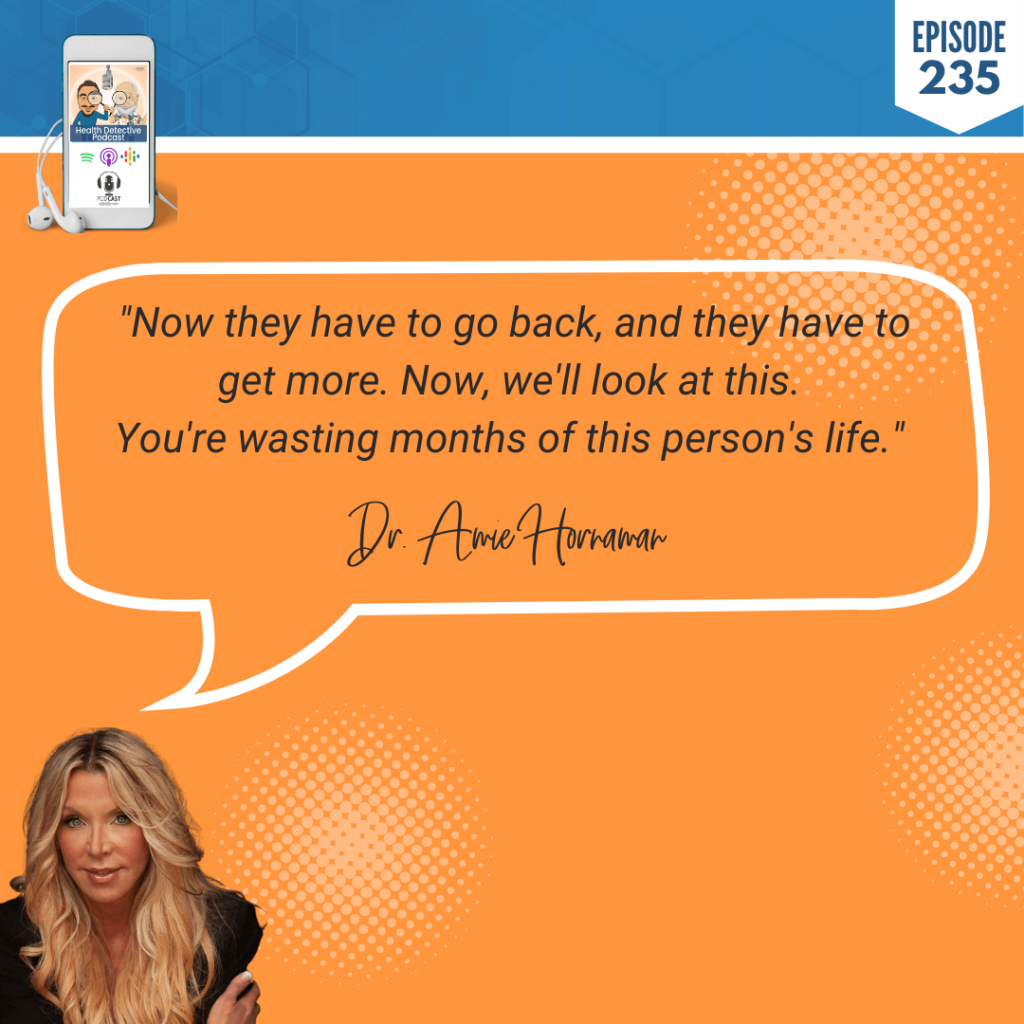
I think what a lot of women or patients in general deal with is they’ll go to their doctor, and they’ll say, okay, this is my problem. They’ll do this, just one set of labs. And now it’s like, whoa, okay, that didn’t show us anything. Now they have to go back, and they have to get more. Now, we’ll look at this. You’re wasting months of this person’s life.
T2: Get All the Puzzle Pieces
So, let’s just get it all. Let’s get it all and have it right there in front of us, and then we can start connecting the dots too.
Okay, well this is low, which could indicate that over here this is going on too. Oh, yep. Look at that, that’s messed up too. We have to address that. So, I think having all the labs in front of you, or as many as you possibly can, is only going to help you as the practitioner help that person even further. Because now you have the puzzle pieces all in front of you and you can start putting that puzzle together.
[00:13:45] Detective Ev: So specifically, what are some of your preferred labs?
[00:13:47] Dr. Amie Hornaman: Full thyroid panel has to be TSH, Free T4. We know everybody will get those. You gotta have the Free T3 in there, the Reverse T3 because that’s the antithyroid hormone. So, if Reverse T3 is high, that’s going to give you a ton of answers right there that the person is basically in survival mode.
The two antibodies, which I can’t tell you the amount of times I’ve seen one antibody tested when they go to conventional medicine, or nothing, usually nothing. But then sometimes one. And I’m like, do we realize that there’s two? So, both antibodies that test for Hashimoto’s.
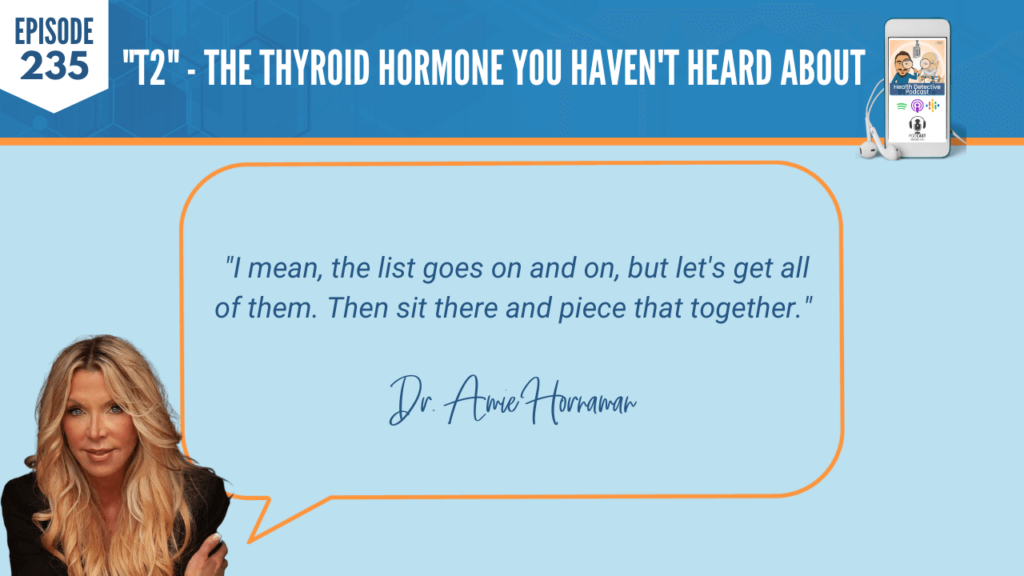
And then let’s get into the hormones. Let’s do total estrogen, estradiol, estrone, progesterone, free and total testosterone, DHEA, SHBG, FSH, LH. I mean, the list goes on and on, but let’s get all of them. Then sit there and piece that together.
T2: Finally, a Thyroid Panel and a Diagnosis
Let’s get insulin, let’s get A1C, let’s get a CBC and CMP, because that tells a lot, right? Let’s get a lipid panel, and then we can go into the nitty gritty, the vitamin D, the mag, all of that. And we can get into the functional testing as well.
But if you just start with the serum, you just start with that blood test, you get a lot of answers there, and that’s going to direct you down another path to do additional testing.
[00:14:56] Detective Ev: And you can do it fairly affordably, which is kinda nice.
Humor me here, because I know for you this might be completely basic. But for some of our audience, sometimes they’re kind of just getting into this and they might be new to the functional space. Can we explain the difference between, everyone uses the term “full thyroid panel”, what does that actually mean, and why is it important?
Because like my mom, for example, she had Graves’ disease. Thankfully she’s doing a lot better now. Unfortunately, we didn’t learn about this until she had her thyroid removed, but functional medicine still saved her life right now.
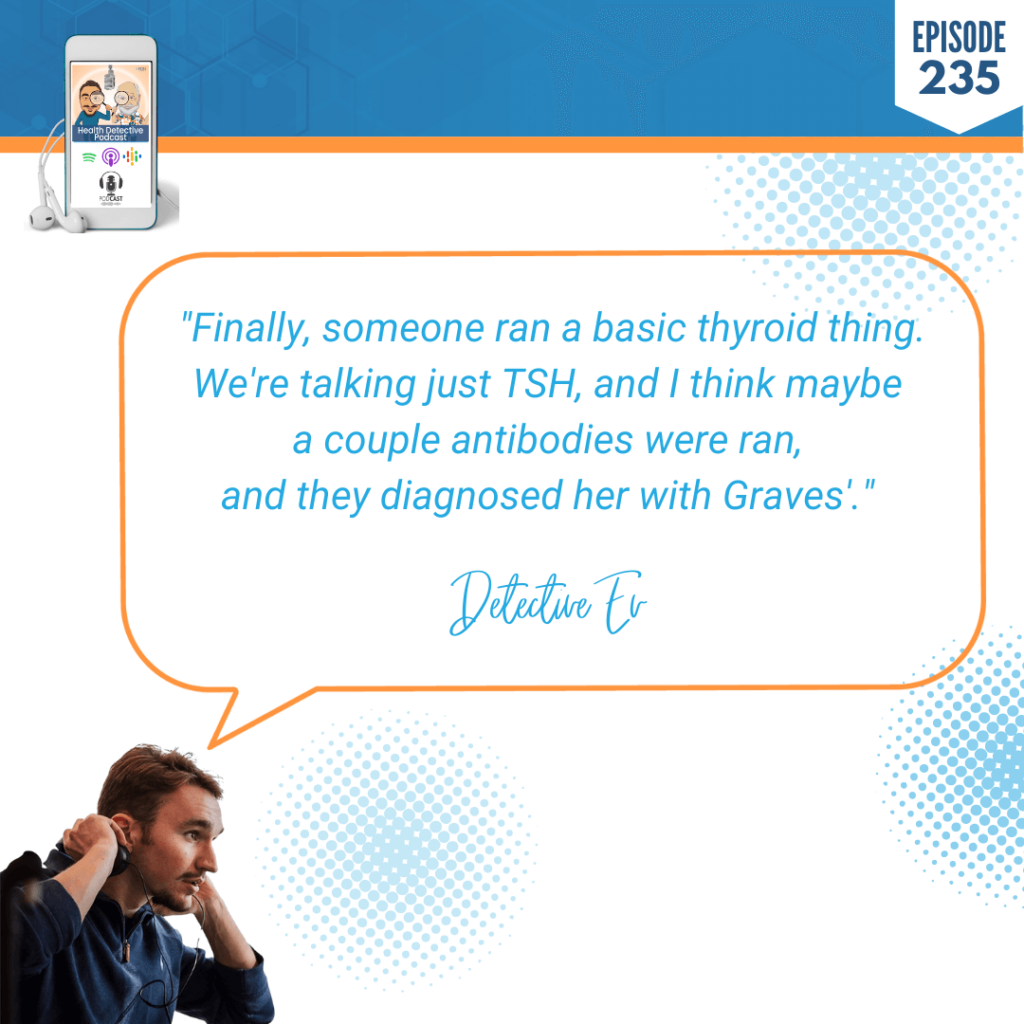
Dr. Amie, she went for seven years not getting a diagnosis. Like you told us, it’s all in your head. You own a business, so you need to be less stressed. She was crazy low TSH. Finally, someone ran a basic thyroid thing. We’re talking just TSH, and I think maybe a couple antibodies were ran, and they diagnosed her with Graves’. So, until I had talked to her, no one had ran a full thyroid panel, still.
Again, we know how this story goes, but what is a full thyroid panel and why is it so important?
T2: Take a List
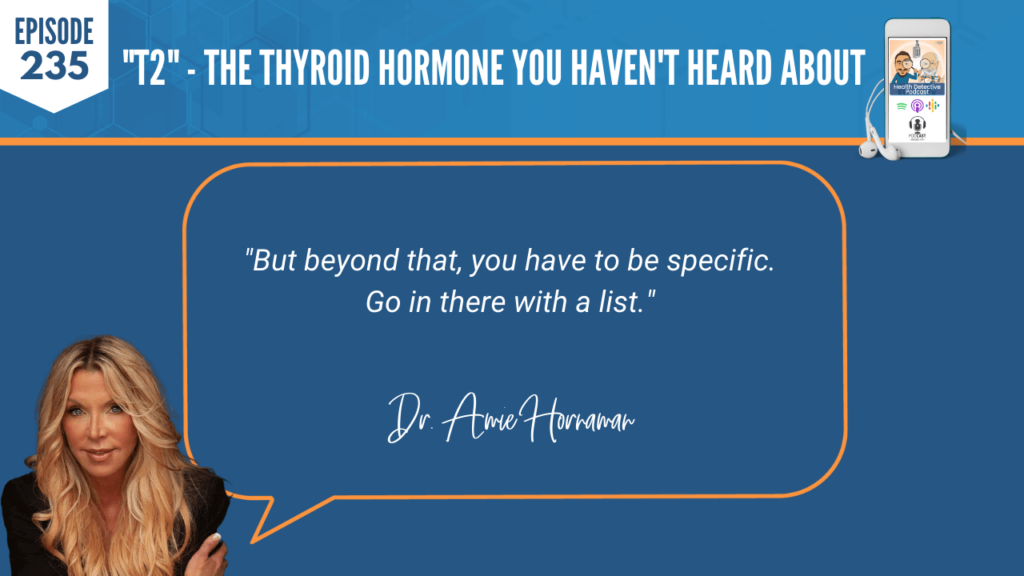
[00:15:49] Dr. Amie Hornaman: That’s great that you asked that because if someone goes to their doctor and asks for a full thyroid, they’re going to get TSH and maybe Free T4. But beyond that, you have to be specific. Go in there with a list.
You better have that Free T3 listed. And I like the totals. The reason why I like the Free forms of thyroid hormone, the Free T3 and Free T4, that’s what’s available in your body right now to get to the cell. So, if you grab a total, that’s a bonus. Definitely get those Free numbers.
Then the Reverse T3, like we said, the antithyroid hormone, that’s important because that gives us a direction as to, well, why is that Reverse high? If they’re on too much T4, they have a conversion problem.
Maybe their ferritin is low. They’re anemic. Maybe they’re estrogen dominant. That’ll push it up. Maybe they’re insulin resistant. That’ll push it up. So, that Reverse T3 that, I guarantee you, if you ask your doc, they’ll say, oh, well I only do that in a clinical setting. That Reverse T3 is so important. And to that answer that docs give, I always argue, well, you’re going to do it in a clinical setting.
If someone’s in the ER or the ICU, the Reverse T3 is going to be high to put them in that survival mode cause our bodies are so smart. If you’re injured, you were just in an accident and your body’s trying to heal, you don’t need to be burning fat. You don’t need to even have brain power or grow your hair. You don’t even need to poop every day. You just need to survive.
T2: Look at the Thyroid Hormones
So, testing Reverse T3 outside of that clinical setting is even more vital. Because that gives us so many answers to look deeper as to what’s pushing that up. Then of course, the two antibodies to check for Hashimoto’s, a hundred percent. That’s the full.
[00:17:29] Detective Ev: I know the answer but humor me. Is it possible that TSH, thyroid stimulating hormone, could look fairly normal, but your antibodies could be through the roof.
[00:17:38] Dr. Amie Hornaman: Usually, the TSH looks normal. In fact, usually the TSH is optimal when I see patients coming to me. I mean that TSH might be below a 2, a beautiful 1.5, 1.7, something like that.
Then you get into those thyroid hormones. Because we have to remember that TSH is a pituitary hormone. It is not a thyroid hormone. So, when we’re measuring the thyroid, I want to know about your thyroid hormones.
I want to know what that Free T3 and Free T4 are; what are those numbers? What is your thyroid gland actually producing? Then yes, the antibodies can be present. That’s when we know, okay, you’re slowly destroying your thyroid. Your body is confused, and it thinks your thyroid is a bad guy. It’s going out and it’s beating it up.
So, we need to look at those thyroid hormones, the Free T3, Free T4 to really see how far down are they? How much destruction has occurred with that Hashimoto’s. And even if it’s not Hashimoto’s, I still want to know those thyroid hormones because sometimes addressing those, that’s the key.
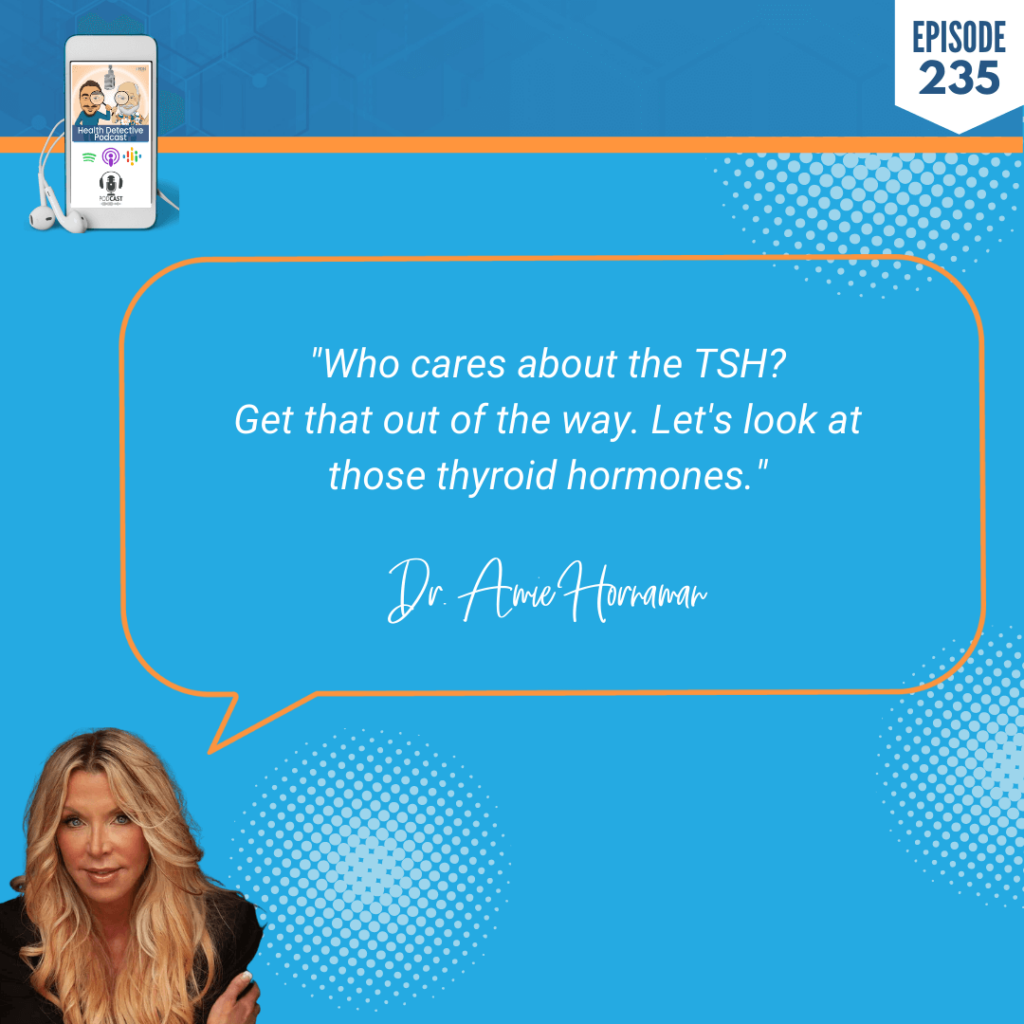
Who cares about the TSH? Get that out of the way. Let’s look at those thyroid hormones.
T2: TSH is Not a Thyroid Hormone
[00:18:42] Detective Ev: Yeah. A good way for people to remember this cause it’s so funny that you talk about, TSH, thyroid stimulating hormone. Everyone hears it the first time, like, oh, it’s a thyroid hormone.
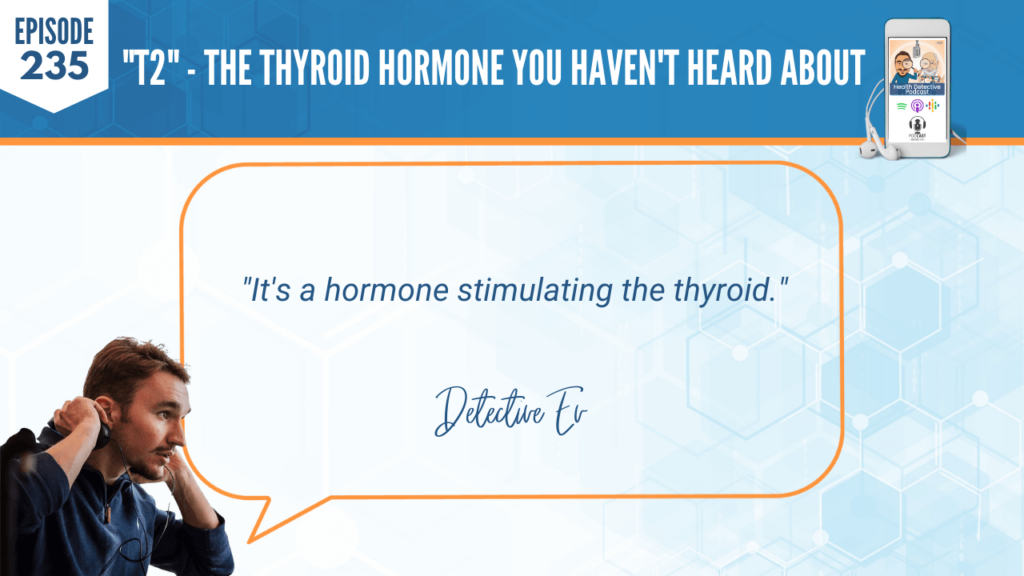
Well, all you have to remember is, what is it actually saying? Thyroid stimulating hormone. It’s a hormone stimulating the thyroid. I don’t get confused by that. That’s how I always remember it, at least, like, let’s actually read the words, you know? Sometimes people complicate signs. I’m like, there’s actually a lot in the words if you just listen and don’t get overwhelmed by it. So again, the TSH thing, huge misleading thing. Every now and then you’ll see it.
We had an FDN practitioner, he’s a clinical advisor. His name’s Ryan Monahan. His TSH was a 150 when he got tested finally. And it was only a 150 because that was as high as the test went. The highest I’ve ever seen was a client of mine named Kate, and she shares this publicly, that’s why I’m sharing it. Hers was a 211 and she got it ran three years ago.
Dr. Amie Hornaman: I have never seen that high.
Detective Ev: It was by far the most insane thing. I didn’t want to insult her, but I said, do you mind, can you send me a screenshot of the labs please? Just so I can check everything. Sure enough, right there, I’m like, wow. I’m glad I didn’t come at her, like, no, that’s not right. Because she was a hundred percent correct.
So, the doctor literally was like, how are you even getting out of bed? She’s a mom. And moms on a mission, man. You don’t mess with them.
[00:19:46] Dr. Amie Hornaman: Adrenaline will do a lot.
T2: Multifactorial Stressors
[00:19:47] Detective Ev: So, there’s a lot of debate about this. There’s the stress of our modern world, environmental toxins, gluten, whatever. Of course, I think it’s multifaceted or multifactorial. What are you seeing are some of the most common causal factors for the women that come and work with you? It’s not as simple as just gluten and just stress, right? Are there more things going on that everyone listening should think about changing if they want to get this stuff under control?
[00:20:09] Dr. Amie Hornaman: Yeah. The answer is so cliche because I feel like we hear it over and over again. But until we really take it in and embody it and make some changes and then see the results of those changes, you don’t really make that connection.
So, for instance, environmental toxins, like you said, we are in a world that that’s increasing. I mean to even find organic produce is tough. We’re kind of getting to the point where, you better go to the local farmer. You better go to the farmer’s market. Because even just going into the grocery store and getting organic, little scary still.
Detective Ev: You don’t know.
Dr. Amie Hornaman: You don’t know for sure.
Everything that’s in our, especially for women, our beauty products, our body wash, our face lotion, the shampoo, everything that we’re being exposed to on a daily basis, add on top of that now, Wi-Fi, 5G. We’re on the computers all day long. The blue light, that’s a stress.
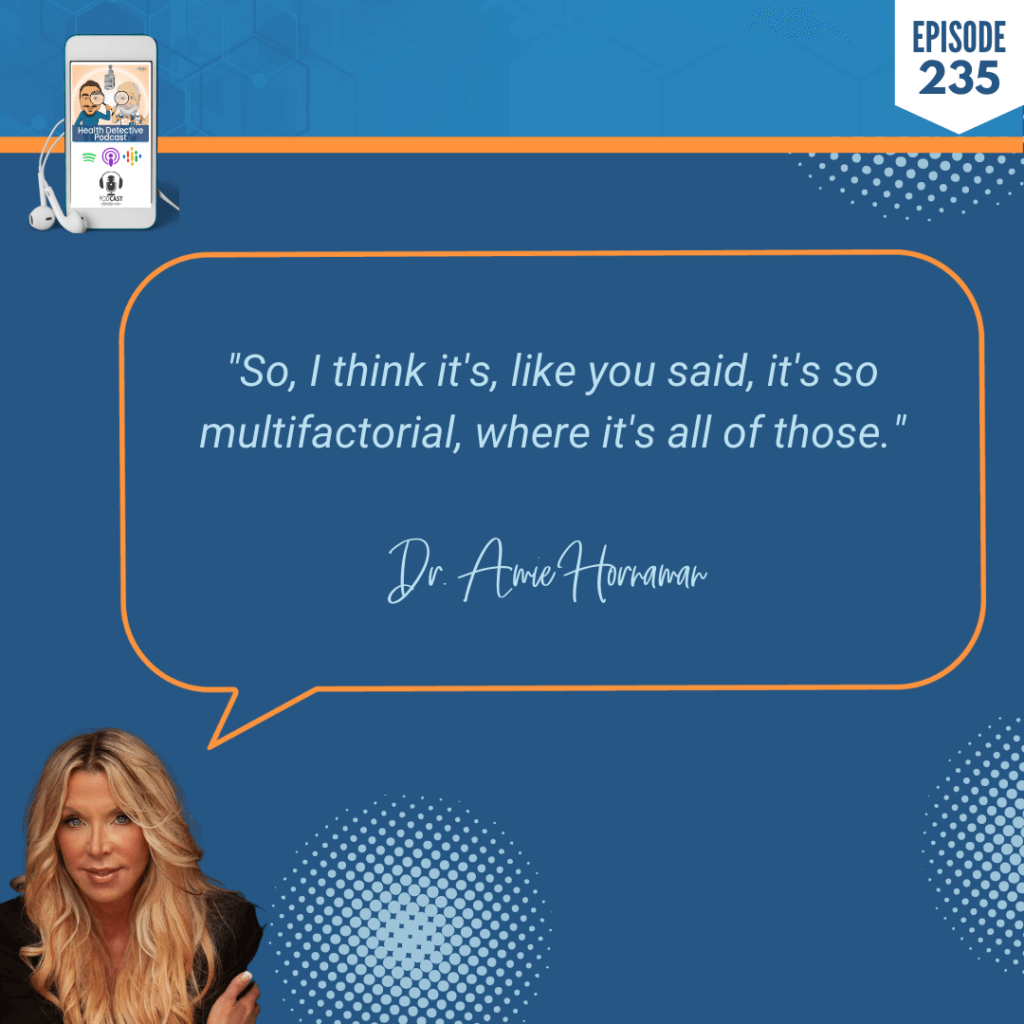
Hormonal issues, that’s a stress. The xenoestrogens that we’re being exposed to, that starts throwing off our hormones, which then affects our thyroid. That’s a stressor as well. So, I think it’s, like you said, it’s so multifactorial, where it’s all of those.
T2: Don’t Forget the Deficiencies
Then we get into the deficiencies. You start looking at magnesium deficiency, iron deficiency, low or high selenium. Then we can go into iodine, which I’m very passionate about. I believe people do need iodine. I think too many people stay away from that. But in low amounts, you can bring that Reverse T3 down. You can really improve some things.
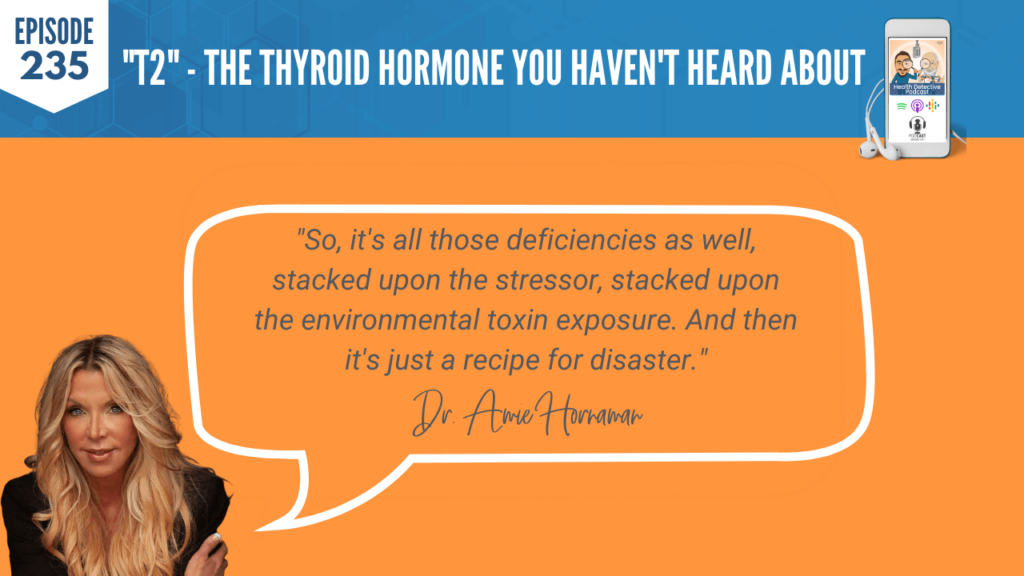
So, it’s all those deficiencies as well, stacked upon the stressor, stacked upon the environmental toxin exposure. And then it’s just a recipe for disaster.
[00:21:46] Detective Ev: All right. I have a variety of questions that I wanted to ask, not disconnected, it’s still the main topic.
But one of the things that you got me right before we started, you talked about T2, this almost like, what did you say? Hidden thyroid?
Dr. Amie Hornaman: Forgotten Thyroid hormone, yeah.
Detective Ev: I’m always transparent. I think, hopefully, people appreciate this on the podcast. I like to consider myself an expert at digging the information out. I don’t necessarily consider myself an expert on any one thing. I don’t know if I’ve ever heard of that, if I’m being a hundred percent transparent.
So, what is that? And is that on, I don’t even know if I’ve seen that on thyroid panels. Can you get that done? But tell us about T2 and why it’s important.
[00:22:19] Dr. Amie Hornaman: Okay. So, when we’re looking at the thyroid, it produces four thyroid hormones, actually, 1, 2, 3, 4. We know about three and four because there’s tests for them, and that’s what we focus on.
T2: BMR and ATP Production
One is inactive, so we can just push that aside. T2 is very active. In fact, it increases basal metabolic rate, so the amount of fat that you’re burning at rest. It actually works at the mitochondrial level. What you’re going to see when we address T2, when we add in T2, and I’ll get that in a second, is you will not see the thyroid labs change. There’s no thyroid mimetic effect. It’s not going to make a person all of a sudden look hyper.
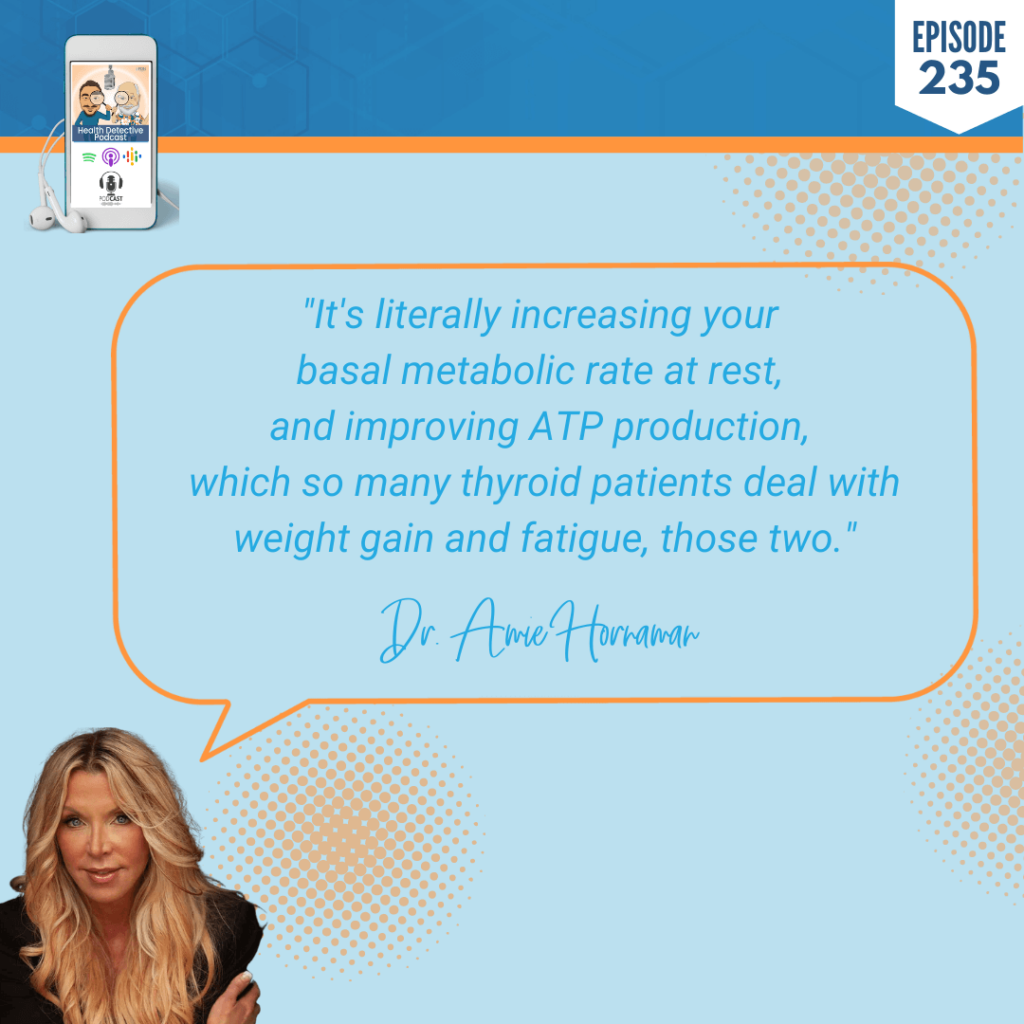
If you take T3, you’re going to get this increase in T3, you’re going to get a suppression of TSH. And if you’re working with conventional medicine, they’re going to call you hyper. Like, oh my God, you’re hyper, you’re going to have a heart attack and bone loss. But T2 does not do that. It has no effect on the cardiovascular system. It has no thyroid mimetic effect, so that’s a bonus. It’s literally increasing your basal metabolic rate at rest, and improving ATP production, which so many thyroid patients deal with weight gain and fatigue, those two. That’s what T2 will address.
It is not in any conventional test yet. We can test it in studies. So, I’ve been diving into T2 for about 15 years now, using it on the sign and supplemental form with my patients and seeing tremendous improvement. Tremendous. Especially if they’re kind of stuck in that conventional system where they’re on T4 only or they’re not quite on the right thyroid treatment. They’re in that struggle/frustration mode with weight, that they’re ready to take a bridge because nothing is working. You add in T2 and now you start to see that metabolism increase.
T2: Only Burning Body Fat
I always like to refer back to bodybuilders, even though I came from that. They really are the OGs of biohacking. I mean, they’ve experimented on themselves long before; they were using peptides like 20 years ago. Now we’re all like, oh, peptides. So, very interesting.
I heard a professional bodybuilder, who trains other pros, talk. He said, you know, I don’t let my people use T3 because it is abused in the bodybuilding world to lose fat. People will take T3 thyroid medication when they’re getting ready for a show or to lose fat because it’s going to do that, but it’s going to shut down your own thyroid production. And they’re going to come out the other side with a thyroid problem.
He goes, I don’t let my pros use T3 because number one, it’s going to burn your muscle and your fat at the same time. It doesn’t directly just burn fat. It doesn’t discriminate. And number two, they’re going to come out the other side with a thyroid problem needing thyroid medication the rest of their life, that they just induced upon themselves for no reason.
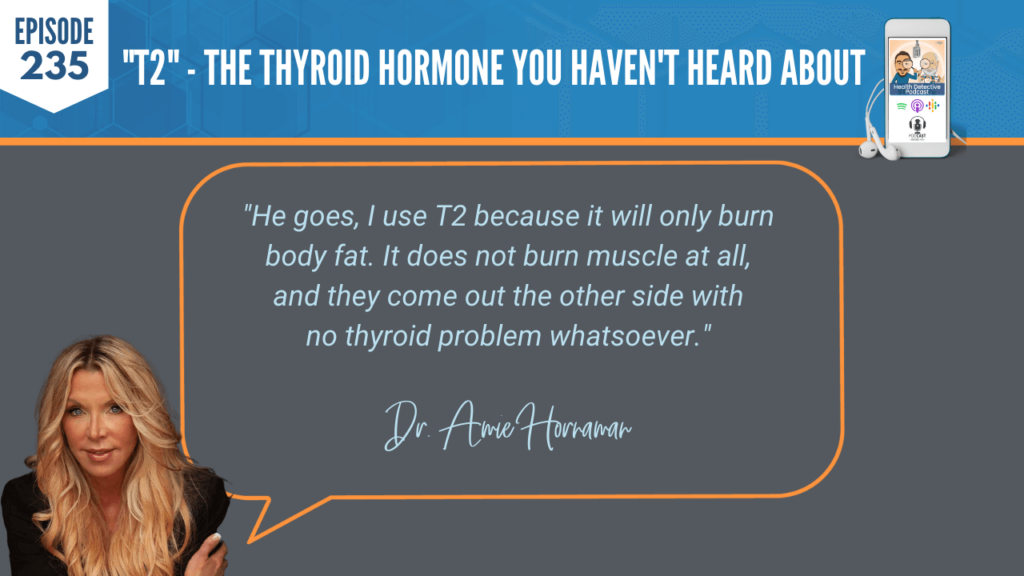
He goes, I use T2 because it will only burn body fat. It does not burn muscle at all, and they come out the other side with no thyroid problem whatsoever. And then, I mean, stacked upon all the research that I’ve done and actually looking at the studies on T2, I was like, yes. I love hearing that somebody else is experimented with this because it’s true.
T2: The Forgotten Thyroid Hormone
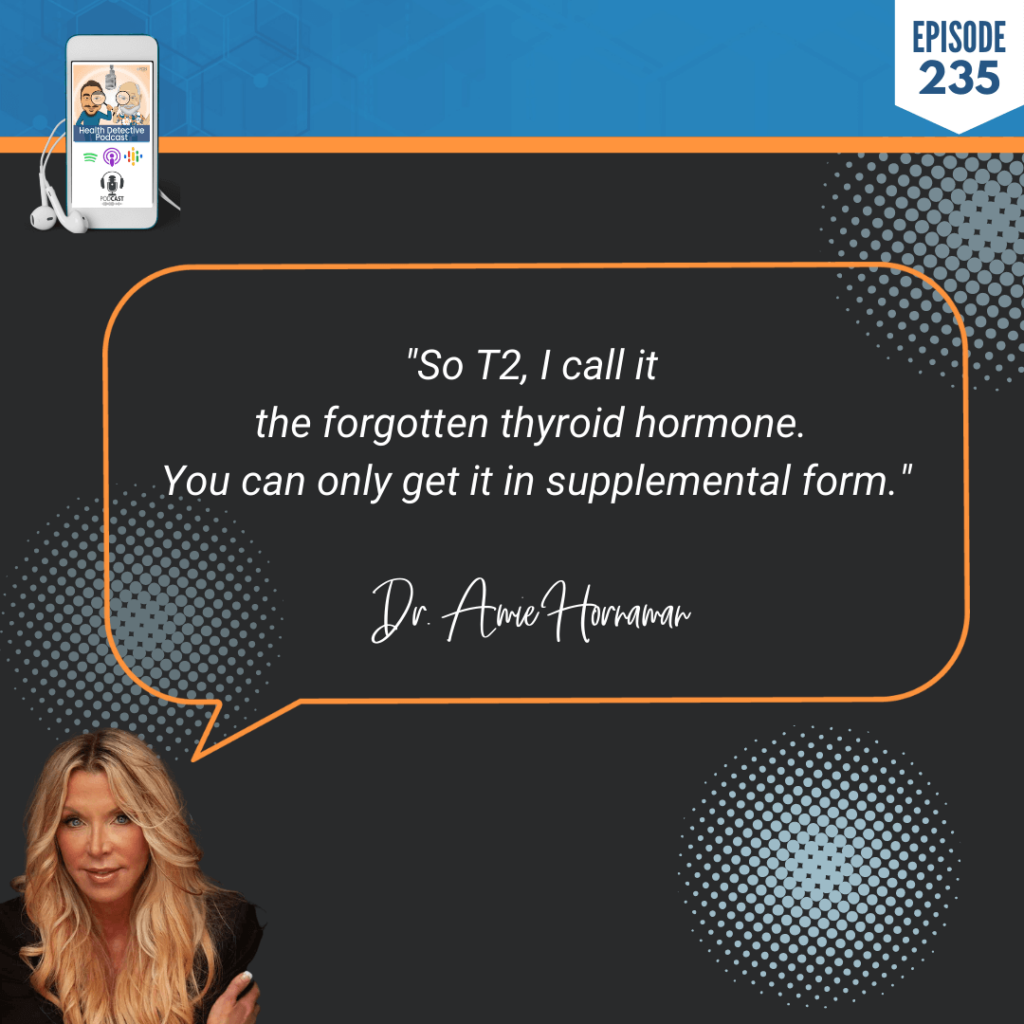
So T2, I call it the forgotten thyroid hormone. You can only get it in supplemental form. It does occur naturally in natural desiccated thyroid medication. So, your Armour, your NP, it occurs, but in a tiny little amount. If you have a 60-milligram tab of Armour, you might be getting eight or nine micrograms of T2. When you take it in supplemental form, you can get like a 100, 150, which is what you use in the studies to really produce that body fat loss.
[00:25:42] Detective Ev: Okay. Well, first of all, something to think about here. If the person who trains pro body builders isn’t even recommending T3, that’s probably, you know, considering what some of those people will put into their bodies, might be something to consider here.
Fascinating stuff with the T2. I feel a little better now knowing that this isn’t actually something that is widely like tested for or something. Cause I’m like, I can’t believe I don’t know about that. This transitioned perfectly though into the next thing I wanted to ask. Because a lot of people will, whenever we post something about thyroid, will respond with what about the Armour thyroid and all that kind of stuff.
Two questions. So, one, what is your general opinion? And maybe the second question is the one to start with. My mom’s missing a thyroid. I’m not asking for medical advice here, I’m asking if this was you that didn’t have a thyroid, can you replace Synthroid with those types of things? Is that possible? Cause we’ve always been very hesitant with that, admittedly.
T2: Full Thyroidectomy Needs T4 & T3
[00:26:28] Dr. Amie Hornaman: So, your mom doesn’t have a thyroid. This is fantastic because so many people have had either a thyroidectomy, partial thyroidectomy, or radioactive iodine treatment. You take out the thyroid gland that once produced T4 and T3, the thyroid gland that is the main conversion gland. Now we get some conversion of T4 to T3, and for the listeners that don’t know, T4 is inactive, T3 is active. You want to have that conversion happen. That thyroid gland was a main converter when it was in the body, so you take that out too.
Now, to give someone like your mom T4 only, that doesn’t even make sense. She needs T4 and T3 together. Now to answer that first question, it becomes very personalized. We have to say, okay, maybe mom would be best suited with a little bit of Synthroid, T4, and let’s add in some T3 separately. That way we can start really low Liothyronine, just use a little bit. We can go up in her dose and just find her sweet spot, her optimal spot.
Or we can do NDT. We can use Armour thyroid, or NP, because that is T4 and T3 together. And as long as she’s converting that, fantastic. It’s all about really finding what that individual person needs.
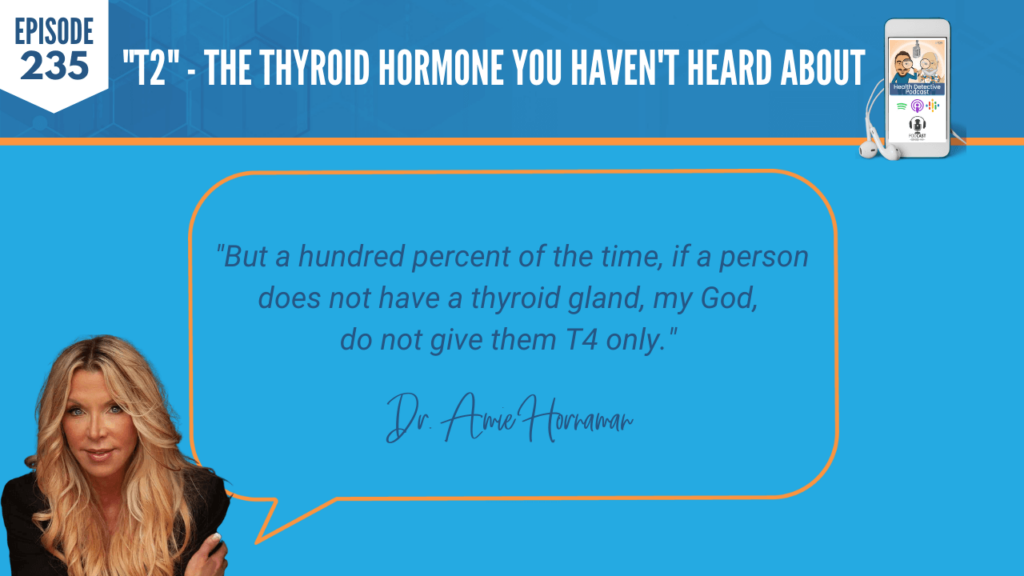
But a hundred percent of the time, if a person does not have a thyroid gland, my God, do not give them T4 only. Give them T3 in some way, some form, because they will thrive.
[00:28:00] Detective Ev: Okay. So again, from a non-medical perspective, and just be careful here, in theory then it is totally possible for someone without a thyroid.
T2: Start Slow and Low
[00:28:08] Dr. Amie Hornaman: To be optimized a hundred percent, yeah.
[00:28:10] Detective Ev: You’re almost making the argument that you would need to have some level of this, at the very least, in with the Synthroid because it’s incomplete.
Dr. Amie Hornaman: Right.
Detective Ev: Okay. Wow. And considering how well my mom’s doing right now, I think this could only just send her up even higher. That’s amazing. Thank you very much.
And going back to the T2 then, cause I realized I didn’t specify this, just so we don’t have a bunch of people on the podcast that are like, oh, where do I buy supplemental T2? Correct me if I’m wrong, this is not something that they should be taking willy-nilly. Right? They should probably be working with someone like you or at the very least testing before they just start going and experimenting. Correct?
[00:28:43] Dr. Amie Hornaman: Yes and no.
I’ve been studying this for 15 years. I actually did come out with a supplement that contains T2 because I got sick of trying to source it from other places and giving it to my patients and being like, here, take this. So, I did come up with a supplement called Thyroid Fixxr. But since you can’t really test for it, I tell people just start low and slow.
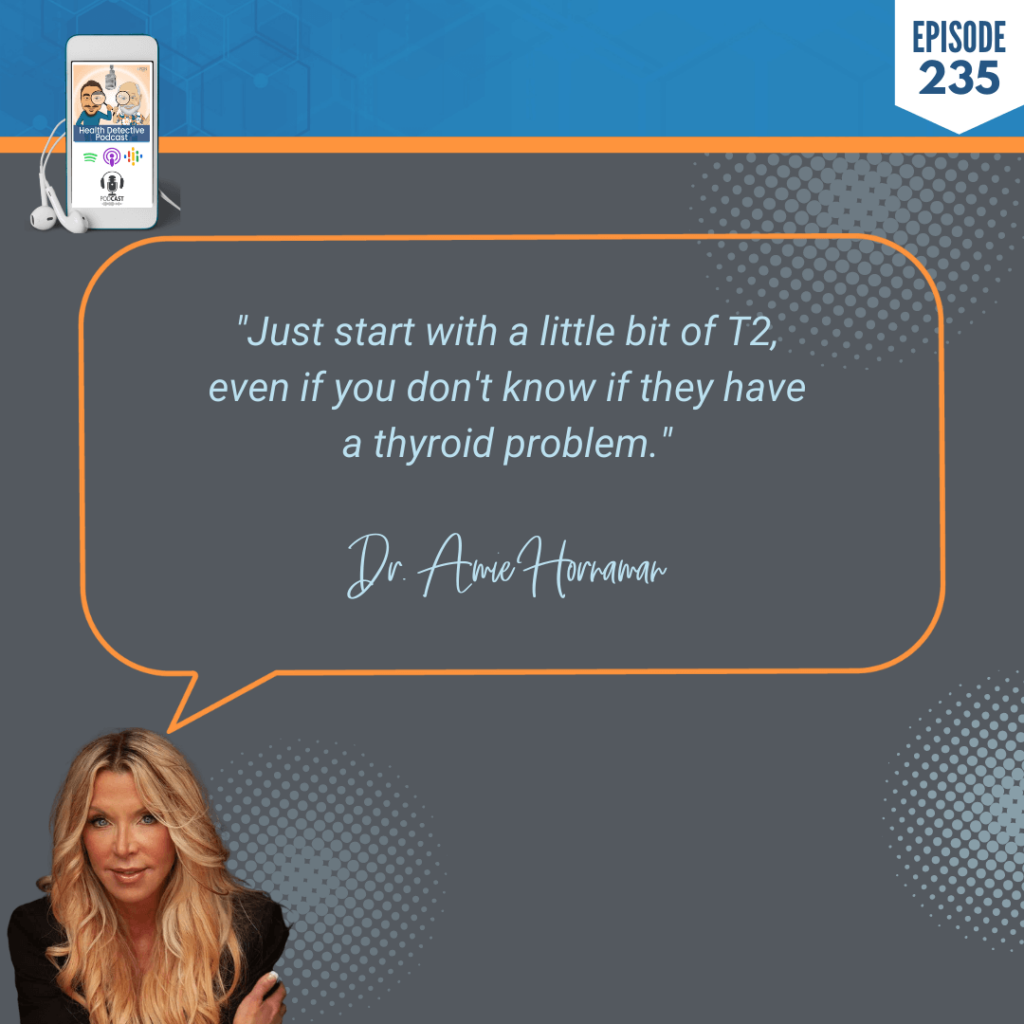
Let’s say one of your FDNs are working with someone that can’t lose weight and you’re doing all the things. I mean, you are just throwing everything at it, and you’re like, what is happening with this person’s metabolism? Right? Just start with a little bit of T2, even if you don’t know if they have a thyroid problem. They can take this cause it’s going to improve their thyroid function.
T2: Thyroid Fixxr Supplement
Like we said, it’s not going to shut down their own thyroid production. And it’s going to work at the mitochondria level, so you can give a little bit and see how they respond. Definitely if you have a thyroid patient that is not optimized whatsoever, add that in just a little bit, and see how they respond.
It’s kind of just like any supplement that we do. You know, most people will respond well. Occasionally you’ll get that weird person that’s like I don’t do well on B12. Okay.
[00:29:50] Detective Ev: Something could be great for one person. Terrible for the next.
[00:29:54] Dr. Amie Hornaman: Right. So, just start low and slow and experiment. See how that person responds.
[00:29:58] Detective Ev: Cool. That was actually a more hopeful answer with this than I thought. Because generally speaking, we’d be depending on the supplement, a little more hesitant. That’s kind of cool to know that people can do that.
Awesome to know that you have that. I did not realize. So that’s called Thyroid Fixxr.
Dr. Amie Hornaman: Thyroid Fixxr, yeah.
Detective Ev: Is there anything else other than T2 or is it just that?
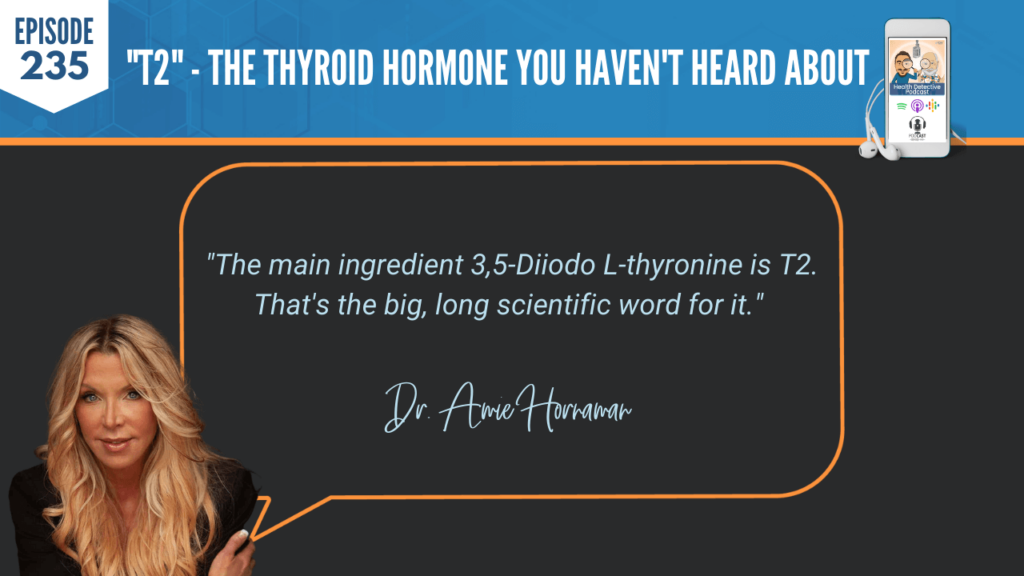
[00:30:11] Dr. Amie Hornaman: I do have a little bit of L-Tyrosine in there because that’s super for the thyroid. I mean, all thyroid patients need L-Tyrosine. Coleus Forskohlii that helps with the fat burning as well. But those are in just small amounts. The main ingredient 3,5-Diiodo L-thyronine is T2. That’s the big, long scientific word for it.
[00:30:28] Detective Ev: Well, to connect the tyrosine thing, I always hate that I can’t remember this cause I always screw up on it. When you say like T4, aren’t we talking about something with tyrosine in there or am I messing that up?
T2: Gluten and the Thyroid
[00:30:37] Dr. Amie Hornaman: Well, yeah. When we’re talking T4, T3, it’s the thyroid hormone molecule with iodine atoms connected to it. So, the T4 has to lose one to become T3. I mean, tyrosine is involved in that process.
[00:30:52] Detective Ev: Yeah. I always remember the Ryan Monahan guy, the same guy that’s now super passionate about this, he talks about that. I thought that was fascinating. Cause I’m like, what a basic thing. Like how many people are just not digesting right or not getting enough protein? You know, and they are not getting tyrosine that they need. It could be a huge issue here.
Two last things, I want to ask about client testimonials, but before that, the gluten thing. Because now what’s fascinating, Dr. Amie, is my mom goes, we’re in Pennsylvania, so she now goes to University of Penn for her medicine stuff, anything Western, she goes there.
What’s crazy is the doctor at UPenn told her last year, she made sure, she said, oh, you had Grave’s Disease, right? History of that? Mom’s like, yes. All that kind of stuff. She’s like, are you gluten free? This is the doctor at UPenn. I thought that was really awesome just to see how far we’re getting along.
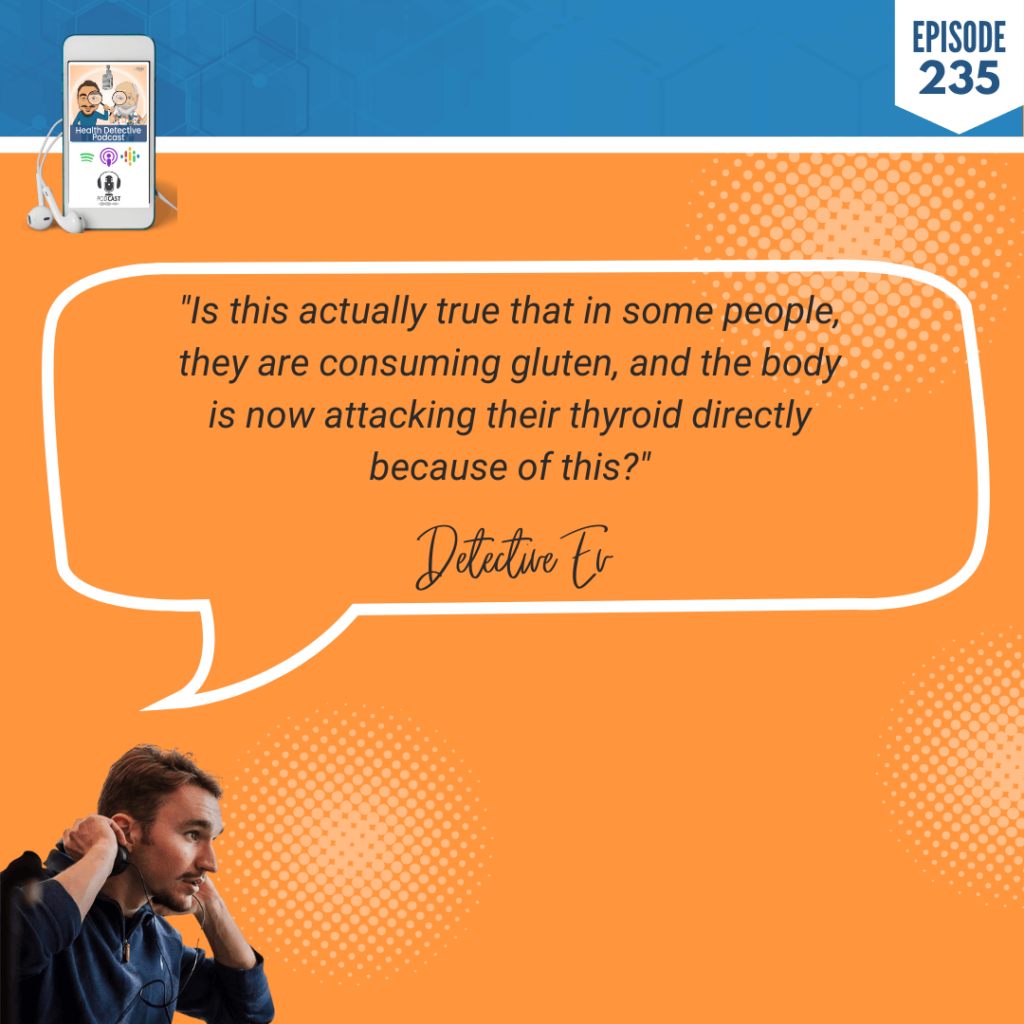
Now, my mom’s been gluten free for years because of what we taught her at FDN, but some people will say that it doesn’t seem to do anything. Others are like, oh, molecular mimicry, it’s attacking your thyroid. And I’m an amateur in the molecular mimicry sense. Is this actually true that in some people, they are consuming gluten, and the body is now attacking their thyroid directly because of this?
T2: Autoimmune Predisposition
[00:31:55] Dr. Amie Hornaman: That’s what we see in the studies. I mean, now you and I know studies can be skewed. They can be biased, but I don’t really see a reason for bias in this. There’s no gain. We’re just saying, listen, when we look at the gliadin molecule, so gluten’s protein is gliadin. When we look at that and we look at the thyroid gland, they look a lot alike.
I always use the analogy of soldiers, when you have an autoimmune condition. In your mom’s case, those soldiers, they were going out and beating her thyroid gland up and dumping all of this thyroid hormone into her body, hence the Grave’s Disease. Those soldiers can be there even after removal of a thyroid gland.
And when we eat gluten, those soldiers who are conditioned to think the thyroid is bad, the thyroid is an invader, it’s a bad guy, they go out and attack when gluten comes in the system. Cause they’re like, oh, there’s that invader again. We need to launch an attack.
Now they go out and attack and what if you don’t have a thyroid gland? Where are they going to go? Maybe your joints; here comes RA. Maybe your skin; here comes psoriasis. God forbid, maybe your brain.
[00:33:06] Detective Ev: I was about to say the brain as well. Yeah. Okay.
[00:33:07] Dr. Amie Hornaman: MS, lupus. Autoimmune begets autoimmune. Where we see one, we see more than one.
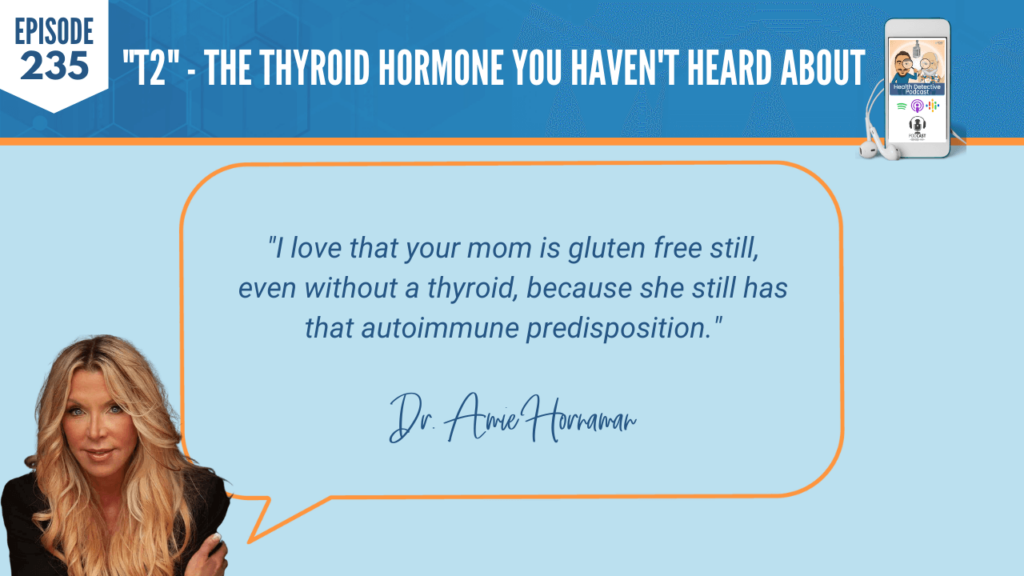
So, absolutely. I love that your mom is gluten free still, even without a thyroid, because she still has that autoimmune predisposition.
T2: Do the Antibodies Matter so Much?
[00:33:19] Detective Ev: Well, right. I actually didn’t know what to say to her with this, cause I always want to be very sure before I say something to a family member especially.
She feels great. Objectively, everything has gotten better. The one thing that hasn’t though is her antibodies are still decently high despite all her changes. They keep telling her, oh, well it’s actually normal for someone to still have high antibodies after the surgery. Now what the heck does normal mean to me from Western medicine?
But again, if I don’t know the answer, I’m like, okay, mama, are you feeling better every day? Are we doing better in every other area? And she’s like, yes. So, I’m a little careful there.
It doesn’t seem to make sense to me though. Shouldn’t those have gone down or do you care about that in a full thyroidectomy patient? Because it’s not partial, it is out.
[00:33:57] Dr. Amie Hornaman: Right. No, that is a fantastic question. We care and we don’t.
So really, whether it’s a full thyroidectomy patient or not, I always say, don’t hang your hat on your antibodies. I get a lot of people that are so hyper focused on their antibodies. Oh, I have 900 antibodies. I go, yeah, but how do you feel? Like, I feel great, and my thyroid hormones are optimized, but I have these antibodies. I go, then chill out. Everything’s okay. We’re going to work to get the antibodies down. But all is well.
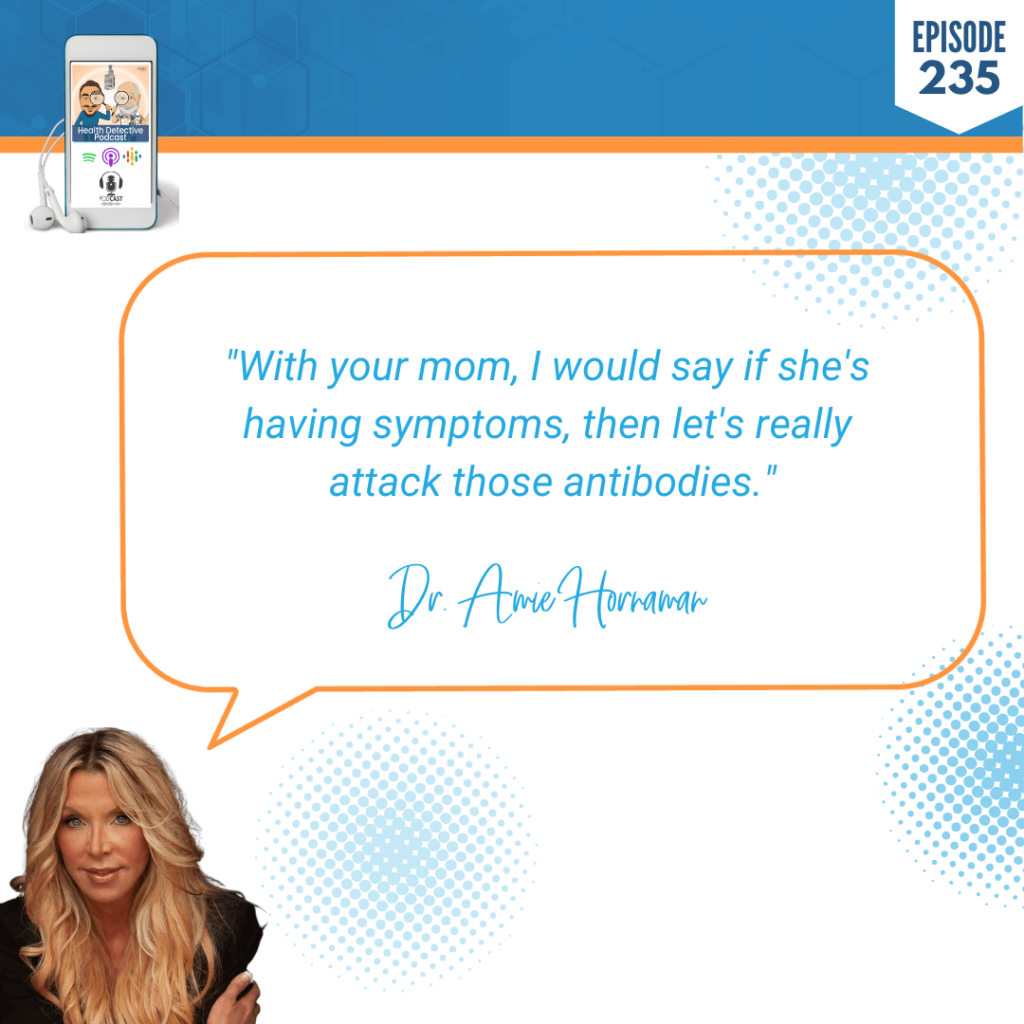
With your mom, I would say if she’s having symptoms, then let’s really attack those antibodies.
T2: Still Thriving with Antibodies?
Maybe we use some low dose naltrexone, maybe we use some black cumin seed oil. You know, she’s already gluten-free. You’re supporting her immune system, which I know you are. So, if we’re doing all of those things, then let’s just chip at those antibodies. Let’s just chip away and not panic. The overall goal, of course, is to reduce them. But sometimes you will, sometimes you won’t.
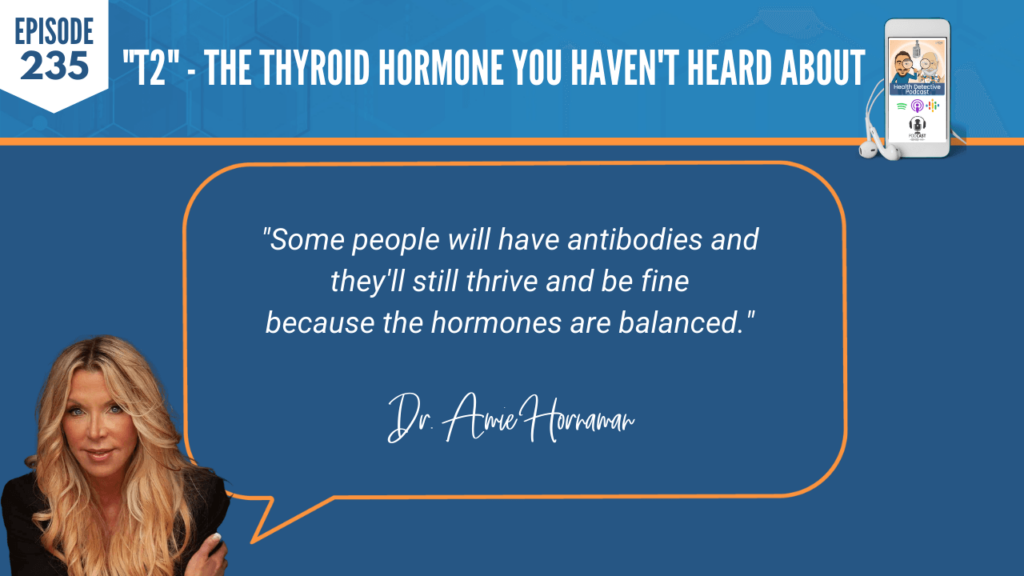
Some people will have antibodies and they’ll still thrive and be fine because the hormones are balanced.
[00:34:54] Detective Ev: Gotcha. Thank you. This is making me feel better. Cause that’s bothered me. Like, why is this? I just thought it was automatically bad. And like you said, sure, in a perfect world we get it better.
But this is where it comes down to treating the person instead of just the paperwork. Cause that’s me honestly falling subject to treating the paperwork. It’s like mom is doing well, she’s doing the best she has in 20 years. So, who am I to necessarily say that it’s a requirement for her to get to where we want to go?
Anyway, with the last several minutes we have here at the very end, of course, we’ll shout out where people can find you. And that’ll all be in the show notes cause. I know our audience and someone’s ears are perking up with this particular episode.
Do you have any, to the degree that you’re able to share it, any just favorite client stories? Cause I’m sure you’ve really changed some people’s lives doing this type of work.
T2: Health Success Story
[00:35:34] Dr. Amie Hornaman: So many. It’s so fun. I’m going to show a couple of them on Sunday when I talk. But one really stands out.
She’s been my like little star patient. She was in her thirties and came to me, had a lot of trouble with fertility. Multiple miscarriages. On top of that, could not lose the weight. Overweight, PCOS, hypothyroidism, and her hormones were all unbalanced. Her progesterone was low, her testosterone was low.
I always preach the message of hope. She really thought, I’m such a tough case. No one else has been able to help me. I’m not quite sure how you’re going to help me. But you came recommended so I’m going to, you know, whatever. She was skeptical, but she dove in.
She has now lost over 40 pounds. I talked to her the other day. She was like, yeah, five more to go, but I’m good if I stayed here. It’s all right. Two beautiful babies. More energy than she knows what to do with. I think she ran, she either ran a marathon or a half a marathon. She’s like, that’s always been my goal. I was always too heavy and too tired, and I couldn’t get through the day. Now she is like beaming, like living life. You can see it in her face, in her skin, her smile, and her countenance. I mean, she’s just amazing.
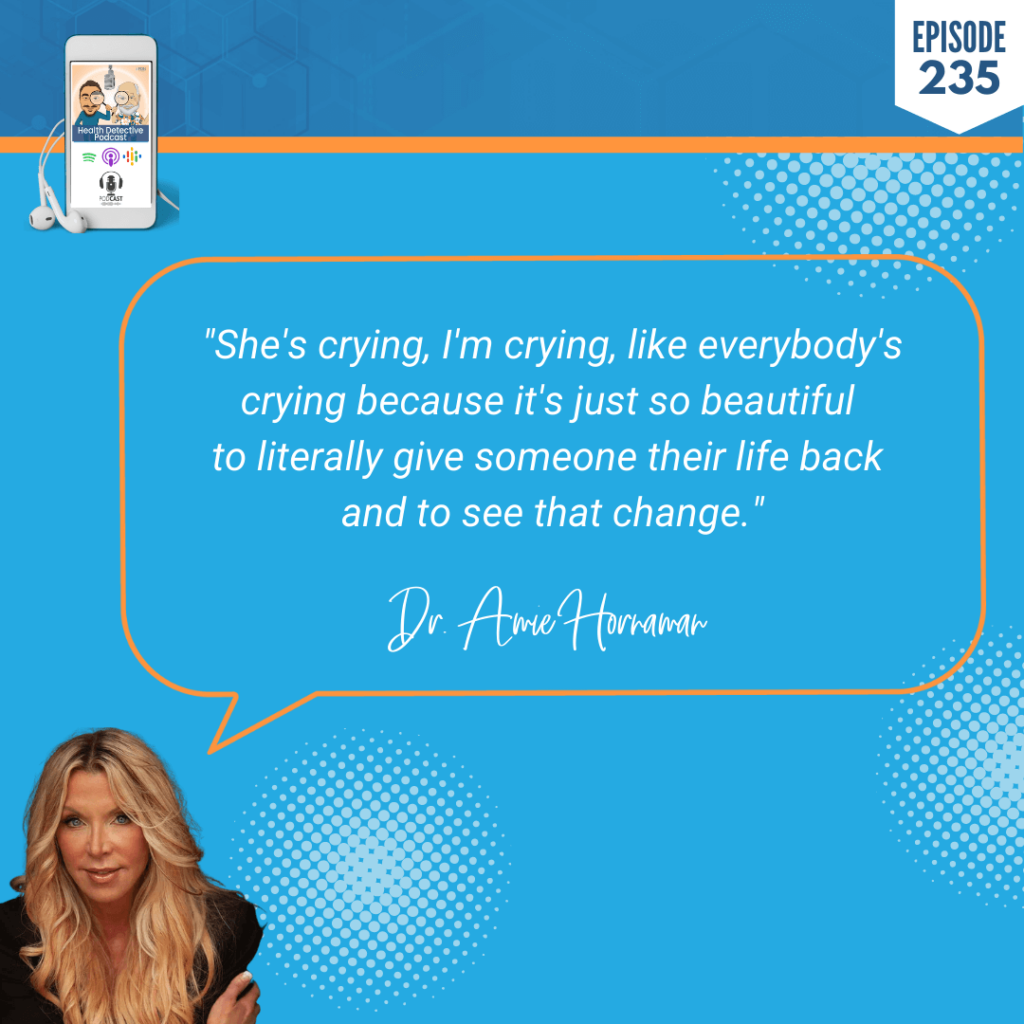
So, to really, literally give someone’s life back. I interviewed her for my podcast too. She’s crying, I’m crying, like everybody’s crying because it’s just so beautiful to literally give someone their life back and to see that change.
Conclusion/ Where to Find Dr. Amie Hornaman
[00:36:58] Detective Ev: Awesome. Yeah, we could probably do a whole podcast on just those. I love that kind of stuff because we can get so technical. But at the end of the day, I believe facts tell, stories sell. Sometimes just hearing that kind of stuff, it connects it for everyone.
So, where can they find you and everything that you offer? Please shout out the podcast, websites, anything like that.
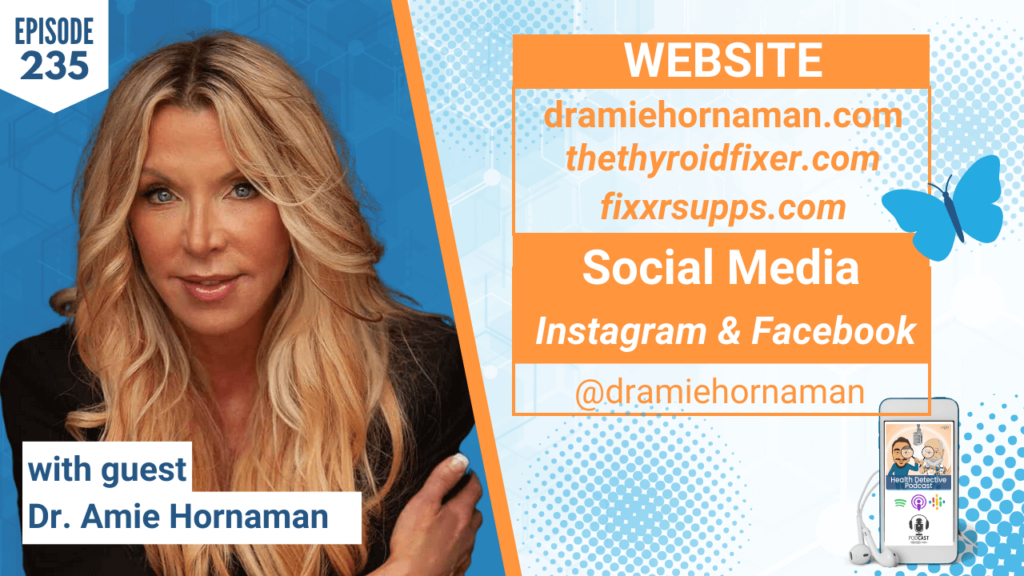
[00:37:15] Dr. Amie Hornaman: Absolutely. The podcast is The Thyroid Fixer Podcast. That’s a great place. I mean, I love talking. Just like you, I love talking. I love giving people information that they can actually take home and implement. So, The Thyroid Fixer Podcast.
My website is dramiehornaman.com. The supplement site is Fixxr Supplement, so fixxrsupps.com.
And then you can find me on all social. So, just look for Dr. Amie Hornaman on Instagram, on Facebook, on all of that, and dive in. Yeah, connect with me, ask me questions. Whatever you need. I love helping.
[00:37:46] Detective Ev: Awesome! Guys, please, that was a wealth of information. Go check her stuff out. If you have any questions, either reach out to them or follow us at fdntraining on Instagram and you can ask questions there.
But Dr. Amie, thank you so much for coming on with us.
Dr. Amie Hornaman: Thank you so much.
You can always visit us at functionaldiagnosticnutrition.com.
For more informational, functional health-oriented podcasts like this one, go to functionaldiagnosticnutrition.com/health-detective-podcast/.
For more information about us, go to functionaldiagnosticnutrition.com/about-fdn-functional-testing/.

